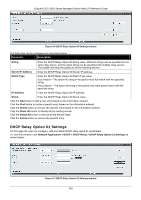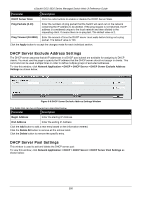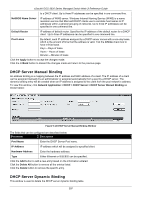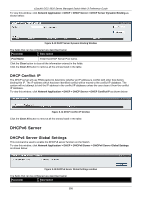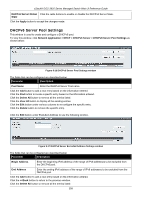D-Link DGS-3620-28TC-SI Product Manual - Page 404
DHCP Server, DHCP Server Global Settings
 |
View all D-Link DGS-3620-28TC-SI manuals
Add to My Manuals
Save this manual to your list of manuals |
Page 404 highlights
xStack® DGS-3620 Series Managed Switch Web UI Reference Guide The fields that can be configured are described below: Parameter Description DHCP Relay Option 61 Default Here the user can select the DHCP Relay Option 61 default action. Drop - Specify to drop the packet. Relay - Specify to relay the packet to an IP address. Enter the IP Address of the default relay server. When there is no matching server found for the packet based on option 61, the relay servers will be determined by this default relay server setting. Client ID MAC Address - The client's client-ID which is the hardware address of client. String - The client's client-ID, which is specified by administrator. Relay Rule Drop - Specify to drop the packet. Relay - Specify to relay the packet to an IP address. Client ID MAC Address - The client's client-ID which is the hardware address of client. String - The client's client-ID, which is specified by administrator. Click the Apply button to accept the changes made. Click the Add button to add a new entry based on the information entered. Click the Delete button to remove the specific entry based on the information entered. Click the Delete All button to remove all the entries listed. DHCP Server DHCP, or Dynamic Host Configuration Protocol, allows the switch to delegate IP addresses, subnet masks, default gateways and other IP parameters to devices that request this information. This occurs when a DHCP enabled device is booted on or attached to the locally attached network. This device is known as the DHCP client and when enabled, it will emit query messages on the network before any IP parameters are set. When the DHCP server receives this request, it returns a response to the client, containing the previously mentioned IP information that the DHCP client then utilizes and sets on its local configurations. The user can configure many DHCP related parameters that it will utilize on its locally attached network, to control and limit the IP settings of clients desiring an automatic IP configuration, such as the lease time of the allotted IP address, the range of IP addresses that will be allowed in its DHCP pool, the ability to exclude various IP addresses within the pool so as not to make identical entries on its network, or to assign the IP address of an important device (such as a DNS server or the IP address of the default route) to another device on the network. Users also have the ability to bind IP addresses within the DHCP pool to specific MAC addresses in order to keep consistent the IP addresses of devices that may be important to the upkeep of the network that require a static IP address. DHCP Server Global Settings This window is used to configure the DHCP server global parameters. To view this window, click Network Application > DHCP > DHCP Server > DHCP Server Global Settings as shown below: Figure 9-8 DHCP Server Global Settings Window The fields that can be configured are described below: 394







